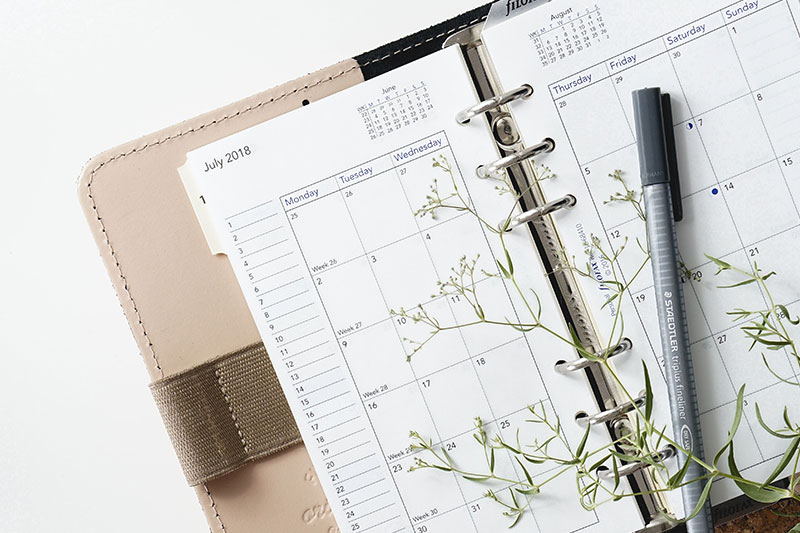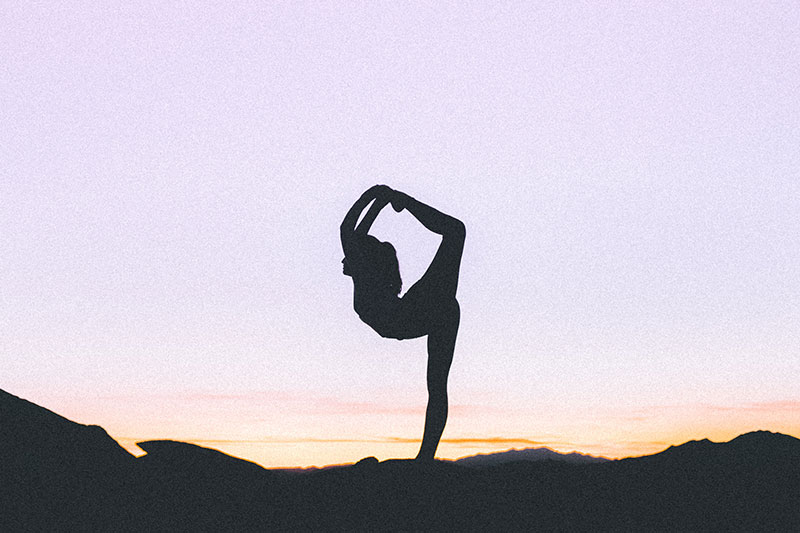The WHO states that “there is no health without mental health”. Here, we’ve compiled the ultimate self care guide to help you find your way to a better, healthier you.
Though most are aware of the importance of a work-life balance, it can often seem like an elusive concept to actualise in our own lives – especially when we’re constantly surrounded by endless stresses and distractions. Take charge of your health and well-being today with our ultimate self-care guide, covering everything from tips on how to reduce stress, increase productivity, and improve mental and physical wellbeing, to help you in your journey to being kinder to yourself.
Develop Good Habits
Here are 9 habits that can help improve your mental and physical wellbeing.
Get Organised
Research from Princeton University found that individuals experienced decreased performance and increased stress when surrounded by physical clutter. A cluttered environment can translate into a cluttered mind, and may in turn negatively affect your mood, which is why it can be helpful to put extra time into cleaning up your surroundings. Making sure your surroundings stay clutter-free can help to relieve unnecessary tension and can even lead to higher focus and productivity, making it a safe, stress-free place to relax and unwind. You can also mentally declutter by making small lifestyle changes like keeping a planner or making a to-do list, which enables you to keep track of your responsibilities and stay on top of your tasks even when life gets overwhelming.
Redesign your workspace with these scientifically proven desk organisation ideas to improve focus, creativity, and productivity, as recommended by leading productivity experts!

Commit To Living Healthy
Physical health is linked to your overall wellbeing and has a strong impact on your mental health, which is why it’s crucial to maintain healthy habits like daily exercise and a balanced diet. In order to stay healthy and functioning, your body requires a balanced diet of proteins, healthy fats, and carbohydrates – studies have also shown that a nutritious diet can reduce symptoms of depression. While it can be tempting to laze around, it’s important to incorporate physical activity into your daily life. Exercise helps your body to release endorphins, which are feel-good chemicals that increase feelings of happiness.
Looking to lead a more balanced lifestyle? We’ve rounded up a healthy habit guide with the most effective tips to help you build those routines.
Digitally Detox
Nowadays, our smartphones offer instant access to distractions like social media, making it easy to fall down a rabbit hole. Constant notifications can make it tempting for you to constantly reach for your phone, taking up hours of your time as you mindlessly refresh your Instagram page or scroll through your Facebook timeline. Cutting down on screentime can help you to destress and unwind, improving mental awareness and leading to better productivity in the long run. Learning to unplug can also free up time to focus on the other priorities in your life, like spending quality time with family and friends. Start your digital detox journey today with these handpicked tips.
Set Boundaries
We often undervalue our own time, choosing to overcommit to others and saving little to no time for ourselves. Setting healthy boundaries plays a crucial role in your mental wellbeing by letting you focus on your own emotional, psychological, and physical needs rather than the needs of others. If you’re constantly finding yourself feeling overwhelmed by your obligations, whether it be in a romantic relationship, at work with colleagues, or with family or friends, it’s high time for you to commit to setting – and maintaining – firm boundaries with the people in your life. Being mindful of boundaries can help relieve stress by reducing your workload, helping you to manage your time more efficiently and allowing you to pay attention to the things most important to you.
Practice Gratitude
It’s easy to find yourself stressing out over negative situations in your life. One of the simplest ways to Introduce positivity into your life is by learning to feel thankful for what you have. Practising gratitude can reshape your mindset in a positive way by helping you focus on appreciating the things already in your life, rather than feeling unsatisfied and constantly hoping for something new. In fact, studies have shown that practising gratitude can lead to numerous benefits, such as alleviating symptoms of anxiety and depression and sharpening brain function, as well as improving relationships and boosting your overall happiness levels.
Cut Out Negativity
Sometimes, the best way to eliminate stress is simply by cutting out the root of your stress from your life, whether it be toxic relationships, unhealthy habits, or self-destructive thoughts. Removing things that are contributing to your stress can help you achieve peace and introduce positivity into your life. Keep an eye out for those who bring toxicity into your life – take an honest look at the people in your life and decide which relationships are worth maintaining. Wean off habits that don’t bring value to your life and introduce healthy habits into your routine. When you find yourself thinking negatively, take a moment to focus on the positive. Making changes to your thoughts and surroundings is instrumental in stress management.
Looking to cultivate healthier eating habits? We’ve covered 4 of the best healthy eating apps to help you tune into your body.
Stop Procrastinating
According to the Association for Psychological Science, those who are prone to procrastination tend to have higher levels of stress and lower well-being. Procrastination is one of the biggest contributors to stress – when you constantly put off important tasks, your stress levels can skyrocket, which can further distract you from completing the tasks at hand, thereby causing more stress. This makes it easy to fall into the ‘procrastination accumulation effect’, a vicious cycle that leaves you feeling even more overwhelmed. To help get out of this harmful cycle, try adopting a ‘do-it-now’ habit and work on your most important tasks first. Kick your procrastination habits to the curb with this handy guide.
Meditate Mindfully
Mindful meditation refers to the practice of slowing down your thoughts, releasing feelings of negativity, and achieving inner peace. Studies have shown that practising intermittent meditation during the day can help to relieve symptoms of stress and anxiety, as well as to stimulate focus and improve sleep. Having long been hailed as a way to improve both your mental and physical health, meditation techniques vary but generally involve deep breathing, muscle relaxation, and self-awareness. As it may be difficult to get started – especially if you find yourself having to set aside extra time and effort to meditate – you can begin by allocating small moments for meditation into your existing routine. Once you get used to meditating daily, you can start to extend your sessions.
Make Sleep A Priority
While going to sleep makes up the last part of your day, it’s certainly not the least. Research has proven that getting adequate sleep is vital to our overall health and well-being and can lead to improvements in mental health. Often hailed as a fundamental part of self-care, developing healthy sleep habits can help refresh and energise you for the day, so make sure you’re getting enough rest – experts recommend 7 to 9 hours of sleep per day. Feeling restless? Try these apps and podcasts to help you doze off.

Wellness Trends to Try
Here’s what you need to know about the hottest wellness trends in 2020.
Shinrin-yoku (Forest Bathing)
A form of ecotherapy that originated from Japan, shinrin-yoku is a call to reconnect with nature. Directly translated as ‘forest bathing’, this practice involves tuning in to one’s senses of sight, hearing, taste, smell, and touch by immersing into a natural environment. Research has linked this therapeutic practice with a multitude of positive health benefits, such as strengthened immunity, better moods, and reduced stress.
Ear Seeding
A form of auriculotherapy, the practice of ear seeding is deeply rooted in the ancient Chinese practice of acupuncture and acupressure. Based on the theory that health problems can be alleviated by stimulating pressure points on the body, ear seeding involves taping ‘seeds’ of silver or gold to certain points in the ear. It is believed that the light pressure from the seeds can trigger the reflex centres of the brain, helping to relax the nervous system and can help with issues such as back pain, weight loss, stress, and sleeping problems.
Jiriki Yoga
Founded by Yu Yagami in 1993, Jiriki yoga is a form of Japanese yoga designed to restore your body’s chi, or ‘life force’. Rooted in ancient Buddhist practices, Jiriki takes a holistic approach to physical, mental, and spiritual wellbeing by working to harmonise the chi in the body, which allows you to build up your own natural healing ability and flush out toxins. While its main aim is to cure and prevent chronic pain and disorder, Jiriki can also alleviate stress by releasing numbness and relaxing tension in the body.
Sound Bath Healing
Sound bath healing is an ancient healing practice that uses sounds of varying frequencies to cleanse and heal the soul. It is believed that the vibrations in the sound waves have a relaxing and healing effect on the mind and body, and has been linked to reductions in stress and anxiety. Taking a holistic approach to relaxation and healing, sound baths offer an escape from the everyday stresses of modern-day life, promoting self-discovery and reflection by placing the body into a deeply immersive, meditative state.

Tools to Help You in Your Wellness Journey
Here’s our roundup of the best wellness apps and podcasts out there to help you reach your full potential.
Mobile Apps
Meditate with Calmer You
The latest brainchild of Nick Begley, former head of research at Headspace, Calmer You is an app dedicated to helping users build an anxiety-free future. Turning self-development books into actionable, app-based courses, Calmer You incorporates mindfulness and CBT techniques, helping users form positive habits that continue to help them self-regulate their anxiety. With everything from self-compassion exercises to cognitive behavioural therapy, mindfulness techniques to diaphragmatic breathing, the app provides its users with techniques to break down their worries, boost their self-esteem, relieve their physical symptoms of anxiety, and help them make decisions.
Cost: Free for select features; USD 7.99/month for full access
Available: iOS and Android
Hike with AllTrails
Looking to exercise outdoors but are unsure where to go? Look no further than AllTrails, an app that helps you find the best running, biking, and hiking trails near you. With photos and reviews from other users for you to see, this app also has the ability to filter by rating, length, and difficulty so that you can pick the perfect trail for you. You can even explore a new area with its inbuilt GPS tracker to help you find your way! Once you arrive at the designated trail, you can check-in on the app and download a map as well as other important information for offline viewing.
Cost: Free for select features; USD 29.99/year for full access
Available: iOS and Android
Focus with Flipd
Train your mind to stay focused with Flipd. A productivity app that aims to help you stay on track, Flipd encourages you to spend time away from your phone, keeping track of how long you unplug with its ‘Mindful Moments’ feature which locks your phone for a specified period of time. This app can also help you digitally detox by blocking distracting apps that may deter users from accomplishing important tasks. Also included are productivity tips, a library of guided meditations, and self-care content to help you stay relaxed, present, and focused.
Cost: Free for select features; USD 12.99/year for full access
Available: iOS and Android
Practice Self Care with Aloe Bud
With its retro 8-bit graphics and soft colour scheme, Aloe Bud is an adorably designed app that seeks to bring awareness to the importance of mindfulness and self-care. An “all-in-one, self-care pocket companion,” this app makes use of push notifications to provide gentle daily reminders for activities like drinking water, eating on time, reaching out to friends and taking breaks. Aloe Bud also provides an activity log so that users can log their daily progress and reflect on their achievements.
Cost: Free for select features; USD 3.99 for full access
Available: iOS, with plans to expand to Android
Set Goals with Habitica
Hack your way into better habits with Habitica. A productivity app that encourages users to complete tasks and form solid habits, Habitica is packaged as a role-playing game (RPG) that allows you to create a character and go on fantasy quests by rewarding each completed task with coins or points. By setting and accomplishing daily tasks or habits, users can level up their characters and gear up for battle, while each uncompleted task will lead to in-game punishments. You can even join a party with other users and go on quests together, taking on challenges to complete real-life tasks as a group.
Cost: Free for select features; USD 4.99/month for additional features
Available: iOS or Android
Fall Asleep with Sleep Cycle
With Sleep Cycle, a good night’s sleep is right around the corner. Intuitive and user-friendly, this sleep app aims to optimise your waking time by tracking your sleep cycle so that you can wake up feeling refreshed. After setting your ideal window of time to wake up, Sleep Cycle’s in-built alarm clock system will sense your sleep movements and gently wake you at the lightest sleep phase. Through sensing your sleep movements, Sleep Cycle can also break down each section of your sleep cycle and collate the data into your weekly and monthly sleep patterns.
Cost: Free
Available: iOS or Android
Podcasts
Happier
Hack your way into a happier life with Happier, a podcast hosted by Gretchen Rubin and her sister, Elizabeth Craft. As the best-selling author of The Happiness Project, Gretchen knows a thing or two about finding and maintaining happiness – and she is dedicated to providing listeners with practical, manageable advice to creating better habits and getting more out of what life has to offer. Who better than a self-described “happiness bully” to break down the steps to living a more positive, fulfilling life?
Available on: Apple Podcasts, Google Podcasts, Spotify, Stitcher
The Struggle Bus
All aboard The Struggle Bus! Featuring co-hosts Katharine Heller and Sally Tamarkin, this weekly podcast is centred around self-care and navigating the daily challenges of living with mental illness. In each episode, the two best friends answer listener questions, tackling a wide range of topics from friends and family to love and work. The chatty duo offers a fun and conversational atmosphere in their quest to normalise discussions about mental health.
Available on: Apple Podcasts, Google Podcasts, Stitcher, iHeart Radio
Well Now
Created by essential oil and skincare brand Saje Natural Wellness, Well Now is a podcast focused on guiding listeners into becoming more conscious of their health and wellbeing. Aimed at exploring the relationship between traditional and natural alternatives to medicine, Well Now opens the dialogue by inviting alternative therapists, wellness practitioners, and medical experts to share their personal health stories, showcasing their different perspectives on an array of mental and physical health-related topics.
Available on: Apple Podcasts, Spotify, Stitcher
Hurry Slowly
As its title suggests, Hurry Slowly centres its discussion on the importance of slowing down when tackling the universal struggle of not having enough time. Host Jocelyn K. Glei believes that the secret to boosting productivity, creativity, and resilience lies in pacing yourself rather than pushing yourself to speed up. Filled to the brim with inspiring interviews with thought leaders in different areas of expertise, this podcast opens an insightful dialogue about finding a healthy balance between life and work.
Available on: Apple Podcasts, Google Podcasts
MindBodyGreen
Wellness site mindbodygreen founder Jacob Wachob discusses mental, physical, spiritual, and environmental wellbeing in his podcast of the same name. Ranging from topics like health and meditation to sustainability and wellness, Jacob invites guests from the health sphere to have a raw and candid conversation as they share their expertise, insights, and personal wellness journeys in an effort to inspire and empower listeners to create a balanced and intentional lifestyle.
Available on: Apple Podcasts, Google Podcasts, Player FM, iHeart Radio
Sleep With Me
Having suffered from insomnia his whole life, host Drew Ackerman is on a mission to help those who face similar struggles. Listeners can doze off to the monotonous cadence of Drew’s voice as he tells meandering tales in a podcast that is designed to, quite literally, bore you to sleep. With a wide variety of topics ranging from recaps of TV shows to rambling, nonsense bedtime stories, each episode is 60 to 90 minutes long, giving you plenty of time to tune out and fall into drowsy unconsciousness.
Available on: Apple Podcasts, Google Podcasts, Spotify, RadioPublic
To keep up-to-date with our latest health and wellness topics, follow us on Facebook and Instagram.





